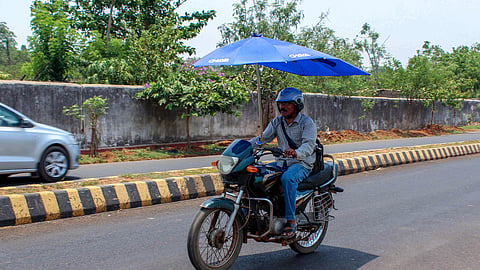

Heat and humidity in the tropics have exceeded the safety threshold for outdoor workers involved in heavy labour, specifically in construction, agriculture, fisheries and forestry sectors, reveals a new study.
This has had a negative impact on the health of the outdoor working population and is also inflicting economic loss on the tropics.
The study estimates the cost of lost potential labour productivity for outdoor workers from heat from several hundred billion to over 2 trillion dollars per year. As many as one billion outdoor workers live in the tropics.
If the tropics warms up by an additional 1°C, it would result in nearly 800 million people losing over half of their working hours per year, the study finds. The resultant loss of labour productivity and wages would push outdoor workers into a web of poverty.
The estimated numbers are likely undercounted as it doesn't factor in informal household work, such as firewood and water collection, and those engaged in informal manufacturing. Nearly 60%–70% of the global labour force participates in the informal economy, with approximately 67% and 90% of workers older than 15 years in informal employment in emerging and developing countries, respectively.
The tropics are defined as the geographic region between 30° latitude north and south of the equator, which includes diverse regions, including dry deserts, coastal regions dotted with mangroves and tropical forests. The region is home to most of the world's poor.
The study, Impacts of warming on outdoor worker well-being in the tropics and adaptation options published in the One Earth journal, focused on heat impact on worker health, their well-being, productivity and on how to increase resilience to heat for outdoor workers.
The northern limit of the tropics, called the Tropic of Cancer, runs through the middle of India - from the Rann of Kuchh in the west to Mizoram in the east - though the entire country is considered tropical. India is among those tropical regions that already lost one-fifth (20%) of working hours due to humid heat. A further rise in temperature by 1°C would lead to nearly a loss of one-third (33%) of working hours. It means, rising heat would hinder the productive ability of one in eight people living in the tropics.
The study calculated a 10% reduction in physical work capacity with mild heat stress (i.e. wet bulb globe temperature (WBGT), 18°C) and 78% reduction with extreme heat (WBGT 40°C). The WBGT is a measure of heat stress in direct sunlight, which takes into account temperature, humidity, wind speed, sun angle and cloud cover.
Recently, the Indian Meteorological Department forecasted above normal heat wave days and higher than normal temperature in April-June would have a detrimental effect on outdoor workers.
Health impact
Heat has both near-term (acute) and longer-term (chronic) effects on human health. It affects work capacity and productivity through its physiological effects.
The human body responds to heat through redistributing blood flows to skin where heat is transferred to the environment through dilation of blood vessels, and through sweating and evaporative heat loss. It increases cardiac oxygen demand, but if it goes beyond safe limits, it could lead to potential cardiac arrest or collapse.
Moreover, dehydration decreases blood volume and can compound effects of heat on work capacity. It reduces cognitive function and skilled motor performance, which can affect the pace and quality of work.
Dehydration also increases the risk of acute kidney injury and contributes to lung damage and pulmonary stress, particularly among those with underlying lung disease.
In India-like countries, where chronic dehydration leads to scarring of the kidney (fibrosis) and possible chronic kidney disease (CKD), it could also result in the need for a renal replacement therapy. Severe heat stroke can cause persistent brain, heart, kidney, liver, gastrointestinal and lung damage, and an increased risk of subsequent mortality.
Another study published in the journal Neurology shows that there were over 5.2 lakh stroke deaths linked to non-optimal temperatures in 2019. Besides, trends of heat stroke-related deaths are rising globally.
Last year, a study conducted in Tamil Nadu found that occupational exposure to extreme heat more than doubled the risk of miscarriage in pregnant women, with the heat generally raising the overall risk of adverse pregnancy and birth outcomes.
Mitigation measures
The study advocates new and different ways of helping outdoor workers cope up with humid heat, such as encouragement of flexible hours and mandatory breaks to help workers adapt to the effects of heat.
The study also explores factors to help tropical workers better adapt and protect their health in the face of climate change. The interventions suggested include reducing heat exposure in built environments (e.g. urban greening); government-level heat action plans; adaptive administrative actions (e.g. periodic rest breaks, heat-adjusted pacing, etc), and land-use planning (e.g. avoiding deforestation).
"Dry heat is relatively easier to handle. When the body heats up and we drink water, there is evaporation and the body cools down. However, in humid heat, evaporation reduces because of high moisture in the air which hampers the body’s cooling mechanism," says Dr Vimal Mishra, Vikram Sarabhai Chair Professor, Civil Engineering and Earth Sciences, IIT Gandhinagar.